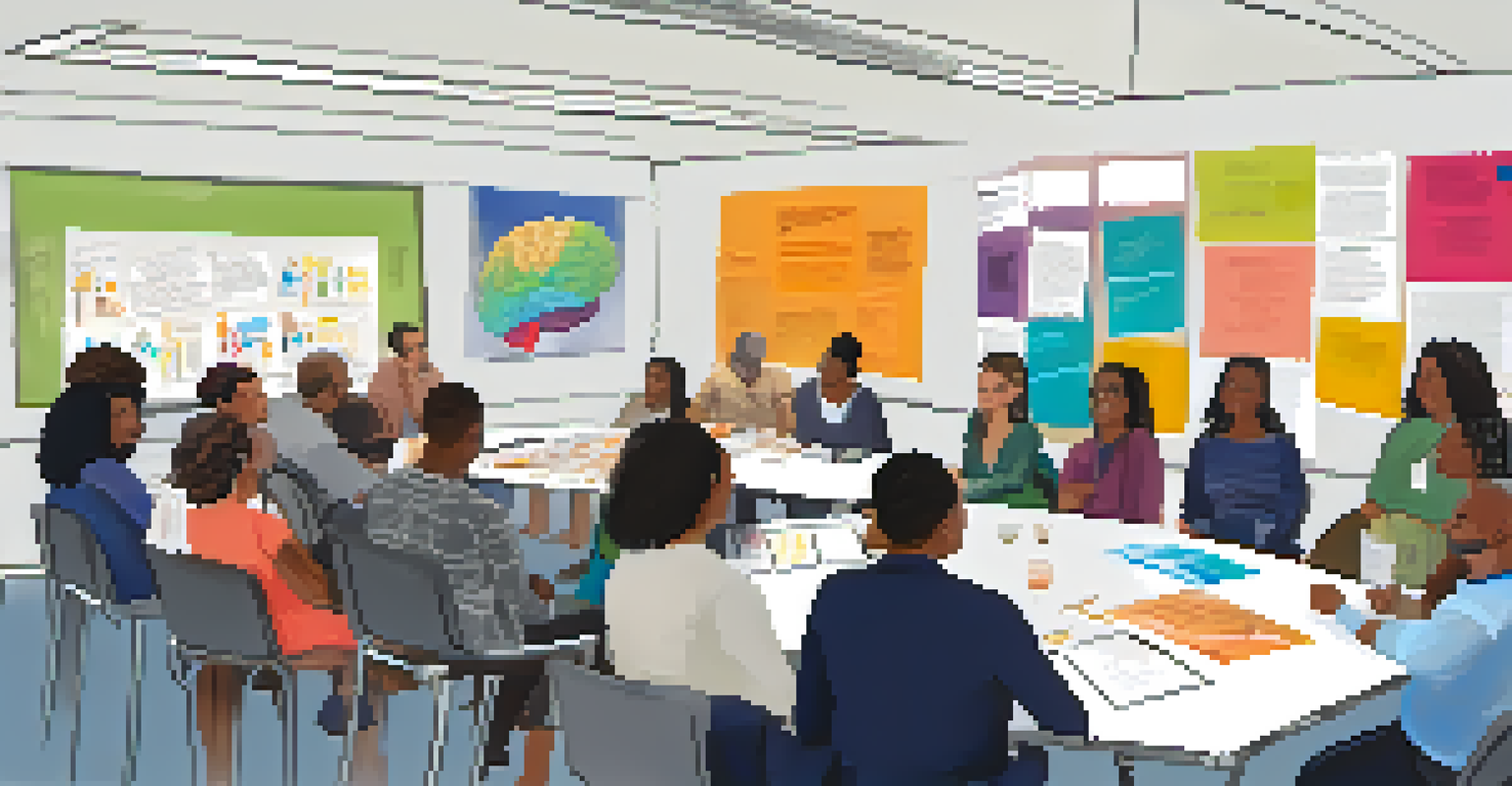Cognitive Health Education: Resources and Tools Available

Understanding Cognitive Health and Its Importance
Cognitive health refers to the ability to think, learn, and remember, all of which are crucial for daily functioning. This aspect of health is not just about avoiding diseases like dementia but also about enhancing our mental abilities as we age. Just like physical health, cognitive health requires attention and care, making education on the topic essential.
The brain is like a muscle. When it is in use, we feel very good. It is only when we start to slack that we feel a sense of loss and discomfort.
An often overlooked aspect of cognitive health is how lifestyle choices impact our mental capabilities. Simple changes like engaging in regular physical activity, maintaining a balanced diet, and staying socially active can significantly boost cognitive function. Understanding these connections can empower individuals to take proactive steps in their cognitive health journey.
Moreover, cognitive health education can help dispel myths and misconceptions surrounding age-related cognitive decline. By learning about cognitive health, individuals can adopt strategies to maintain or even improve their cognitive abilities, leading to a more fulfilling life.
Online Courses for Cognitive Health Education
One of the most accessible ways to enhance your knowledge about cognitive health is through online courses. Platforms like Coursera and edX offer a variety of courses designed by renowned institutions, covering topics from brain health to memory improvement techniques. These courses often include video lectures, readings, and quizzes to help reinforce learning.

Additionally, many organizations, such as the Alzheimer's Association, provide specialized training programs that focus on cognitive health. These courses not only educate individuals but also equip caregivers with essential tools to support those experiencing cognitive decline. Learning from experts in the field can offer valuable insights into practical strategies for maintaining cognitive well-being.
Cognitive Health Basics Explained
Cognitive health is essential for daily functioning and can be enhanced through proactive lifestyle choices.
Online education allows for flexibility, enabling you to learn at your own pace and revisit materials as needed. This convenience makes it easier for anyone interested in cognitive health to gain knowledge without the constraints of traditional classroom settings.
Books and Literature on Cognitive Health
Books can be a fantastic resource for diving deeper into cognitive health topics. Titles like 'The Aging Brain' by David Eagleman and 'How to Remember Everything' by Daniel Levitin provide scientific insights combined with practical tips. These resources can help readers understand the complex workings of the brain and how to enhance their cognitive abilities.
Education is the most powerful weapon which you can use to change the world.
Moreover, many cognitive health books offer personal anecdotes and case studies that make the information relatable. By sharing real-life experiences, authors can illustrate the impact of cognitive health education on everyday life, making the content more engaging and easier to grasp.
In addition to popular titles, academic journals and research papers can also provide valuable information for those seeking an in-depth understanding of cognitive health. While these might be more technical, they can be an excellent source of the latest findings and breakthroughs in the field.
Mobile Apps to Support Cognitive Health
In our tech-driven world, mobile apps have emerged as powerful tools for cognitive health education and improvement. Apps like Lumosity and Elevate offer fun and stimulating games designed to challenge and enhance various cognitive skills such as memory, attention, and problem-solving. These interactive platforms make learning enjoyable and engaging.
Furthermore, mental wellness apps, such as Headspace or Calm, focus on mindfulness and meditation, which are crucial for reducing stress and enhancing cognitive function. These practices not only promote relaxation but also improve focus and clarity of thought, making them essential components of a holistic approach to cognitive health.
Learning Resources Available
A variety of online courses, books, and apps provide accessible education and tools for improving cognitive health.
With the convenience of smartphones, users can easily integrate cognitive training and mindfulness practices into their daily routines. This accessibility ensures that individuals have ongoing opportunities to nurture their cognitive health, no matter where they are.
Community Programs and Workshops for Cognitive Health
Community programs and workshops offer excellent opportunities for learning about cognitive health in a supportive environment. Many local organizations, including libraries and senior centers, host events that focus on brain health, providing valuable resources and expert advice. Engaging with others in these settings can foster a sense of community while promoting cognitive well-being.
These programs often include interactive elements such as group discussions, workshops, and activities designed to stimulate cognitive function. Participants can share experiences, learn from one another, and practice strategies for maintaining cognitive health together. This collaborative approach can make learning about cognitive health more enjoyable and effective.
Moreover, community initiatives can help raise awareness about cognitive health issues, encouraging more people to prioritize their mental well-being. By participating in these programs, individuals can become advocates for cognitive health, spreading knowledge and resources throughout their communities.
Webinars and Virtual Conferences on Cognitive Health
With the rise of virtual events, webinars and online conferences have become invaluable resources for cognitive health education. These events often feature experts discussing the latest research, trends, and practical advice related to cognitive health. Attending these webinars can provide attendees with a wealth of knowledge that is easily accessible from the comfort of their homes.
Additionally, many webinars allow for interactive Q&A sessions, giving participants the chance to engage directly with professionals in the field. This interaction can help clarify complex topics and provide tailored advice based on individual concerns. Such opportunities can make learning more personal and relevant.
Community Support Matters
Engaging in community programs and workshops fosters a sense of belonging while promoting cognitive well-being.
Moreover, recording these sessions often allows attendees to revisit the material later. This flexibility ensures that individuals can absorb the information at their own pace, making it easier to implement new strategies for cognitive health into their daily lives.
Podcasts and Audiobooks on Cognitive Health Topics
Podcasts have exploded in popularity, and many focus on cognitive health and wellness. Shows like 'Brain Health Revolution' and 'The Happiness Lab' provide listeners with expert insights and practical tips on maintaining and enhancing cognitive function. These audio formats make it easy to learn while on the go, whether you're commuting or exercising.
Audiobooks are another great resource for those who prefer listening to reading. Services like Audible offer a range of titles focused on cognitive health, allowing users to absorb knowledge in a more flexible way. This format can be particularly appealing for busy individuals who want to make the most of their time.

Both podcasts and audiobooks create a sense of connection with the host, making complex ideas about cognitive health feel more relatable. This conversational tone helps demystify the subject and encourages listeners to take actionable steps toward improving their cognitive health.